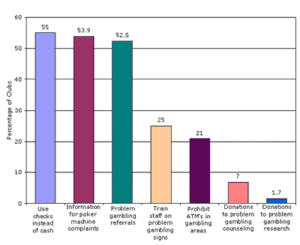The gambling industry often comes under fire for not accepting enough responsibility for current and future problems faced by pathological gamblers (Maniscalco, 2001). In response, many casinos have adopted what are called, “responsible gaming strategies.” Advertising a hotline for problem gamblers in the casino is an example of such a strategy. This week’s WAGER examines a study (Hing, 2001) that evaluated support for and implementation of responsible gaming strategies in gaming clubs in New South Wales (NSW), Australia.
Participants were 2131 staff members (i.e., club managers) of registered gaming clubs who responded to a mail-in survey. The questionnaire examined social principles and practices in reference to responsible gaming strategies2. Questions required gaming clubs to (1) provide demographics and (2) communicate their support for and/or use of industry and venue-level responsible gaming strategies. Of the total, 88% supported industry-level guidelines, such as developing training programs in responsible gaming for club managers and staff. The tendency to support industry-wide responsible gaming strategies did not vary by demographics such as, club location or the number of financial members. Data indicated three responsible gaming strategies were currently employed at the venue-level by a little over half the clubs (Figure 1).
Figure 1. Percentage of Gaming Clubs Currently Using Venue-Level Responsible Gaming Strategies
The more proactive strategies such as, donating funds to gambling-related counseling services or research were only implemented in 7% and 1.7% of the clubs, respectively. It is possible that gaming clubs are resistant to any strategies that might take away from profits.
A major limitation to the study is the response rate. It was very low (17.9%) and potentially not representative of the gaming clubs in New South Wales. The researchers noted that the study population mainly represented clubs with a large number of gaming machines and high gaming machine profits. A more representative sample is necessary to accurately quantify support for and implementation of responsible gaming practices across all types of gaming clubs. Another limitation is the accuracy of the data. Based wholly on the self-reporting of club managers, it is possible the information provided was slightly different than the reality. Follow-up calls to other casino personnel could have confirmed the answers or revealed errors.
Although this study has limited generalizability to other types of gaming clubs in New South Wales, the information presented is valuable. Survey research of this type is essential to monitoring and evaluating the actual practices of gaming clubs. This information can be a barometer of the acceptance by gambling venues of strategies to support responsible gaming and can help in developing strategies that are more likely to be adopted by the gambling industry.
Notes
1 The original N was 247; however, 34 surveys had incomplete data.
2 The survey was an adapted version of the Aupperle (Aupperle, 1982) corporate social responsibility instrument which measures the proportional value of economic, legal, ethical and discretionary components to assess the level of corporate social responsibility of a business.
References
Aupperle, K. (1982). An Empirical Inquiry into the Social Responsibilities as Defined by Corporations. University of Georgia, Georgia.
Hing, N. (2001). Changing the odds: A study of corporate social principles and practices in addressing problem gambling. Journal of Business Ethics, 33, 115-144.
Maniscalco, S. (December 17, 2001). Gambling addict suits vs. casinos are foreseen, "self-exclusion" program may create duty. Lawyers Weekly, pp. 15 M.L.W. 1409.





